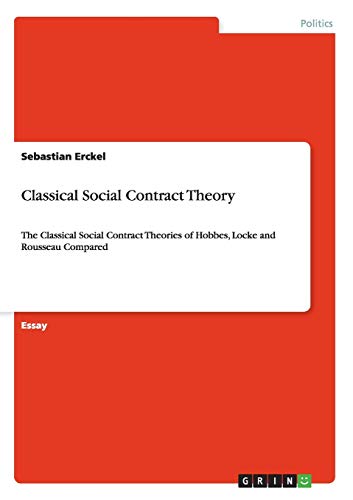Classical Social Contract Theory: The Classical Social Contract Theories of Hobbes, Locke and Rousseau Compared - Softcover

"synopsis" may belong to another edition of this title.
- PublisherGrin Verlag
- Publication date2009
- ISBN 10 364032739X
- ISBN 13 9783640327393
- BindingPaperback
- Number of pages24
Buy New
Learn more about this copy
Shipping:
FREE
Within U.S.A.
Top Search Results from the AbeBooks Marketplace
Classical Social Contract Theory: The Classical Social Contract Theories of Hobbes, Locke and Rousseau Compared
Book Description Paperback. Condition: New. Paperback. An unused, unmarked and unblemished copy.; 100% Satisfaction Guaranteed! Ships same or next business day!. Seller Inventory # 132306270040
Classical Social Contract Theory: The Classical Social Contract Theories of Hobbes, Locke and Rousseau Compared (Paperback or Softback)
Book Description Paperback or Softback. Condition: New. Classical Social Contract Theory: The Classical Social Contract Theories of Hobbes, Locke and Rousseau Compared 0.1. Book. Seller Inventory # BBS-9783640327393
Classical Social Contract Theory
Book Description Taschenbuch. Condition: Neu. This item is printed on demand - it takes 3-4 days longer - Neuware -Essay from the year 2008 in the subject Politics - Political Theory and the History of Ideas Journal, grade: 80%= good, University of Kerala (Department of Political Science), course: Political Theory- Liberal Tradition, language: English, abstract: This essay compares the classical social contract theories of Hobbes, Locke and Rousseau. Different perceptions of the state of nature resulted in different ideas about the social contract and its emphasis on either security (Hobbes), individual rights (Locke) or the collective freedom of Rousseau's general will. Political philosophy is believed to have started with Plato's 'Republic', the first knownsophisticated analysis of a fundamental question that humans have probably beenconcerned with much longer: how should human society be organised, i.e. whoshould rule and why Plato believed that ruling required special training and skillsand should therefore be left to an aristocracy of guardians who had receivedextensive training. While the notion that ruling requires expertise can hardly bedenied there is also agreement among most philosophers that whoever qualifies forthe job of ruling needs to do so with the interest of the people in mind. But what is theinterest of the people and how can it be discovered According to Plato, a necessaryprecondition for rulers is wisdom and that is why he wanted his guardians to beespecially trained in philosophy. One may think that the people themselves shouldknow what is best for them but somewhat surprisingly this idea has been rejected notjust by Plato but also by many philosophers following him. Another approach is to linkrule on Earth to a mandate received from a divine Creator. However, even the ideathat humans could not exist without a government has been questioned, mostnotably by anarchism.Thus, the question of how political rule, the power to make decisions for others, couldbe justified is an essential one. Only legitimate rule creates obligation and withoutobligation it is hard to see how any form of society can survive.It is precisely for these elementary questions that social contract theories attempt toprovide an answer for. The social contract can be seen as a device both for justifyingnot only rule itself but a particular type of rule, and demonstrating that politicalobligation can indeed be demanded. A unique feature of the classical social contracttheories discussed in this paper is that they started out with an analysis of the stateof nature. 24 pp. Englisch. Seller Inventory # 9783640327393
Classical Social Contract Theory : The Classical Social Contract Theories of Hobbes, Locke and Rousseau Compared
Book Description Taschenbuch. Condition: Neu. Druck auf Anfrage Neuware - Printed after ordering - Essay from the year 2008 in the subject Politics - Political Theory and the History of Ideas Journal, grade: 80%= good, University of Kerala (Department of Political Science), course: Political Theory- Liberal Tradition, language: English, abstract: This essay compares the classical social contract theories of Hobbes, Locke and Rousseau. Different perceptions of the state of nature resulted in different ideas about the social contract and its emphasis on either security (Hobbes), individual rights (Locke) or the collective freedom of Rousseau's general will. Political philosophy is believed to have started with Plato's 'Republic', the first knownsophisticated analysis of a fundamental question that humans have probably beenconcerned with much longer: how should human society be organised, i.e. whoshould rule and why Plato believed that ruling required special training and skillsand should therefore be left to an aristocracy of guardians who had receivedextensive training. While the notion that ruling requires expertise can hardly bedenied there is also agreement among most philosophers that whoever qualifies forthe job of ruling needs to do so with the interest of the people in mind. But what is theinterest of the people and how can it be discovered According to Plato, a necessaryprecondition for rulers is wisdom and that is why he wanted his guardians to beespecially trained in philosophy. One may think that the people themselves shouldknow what is best for them but somewhat surprisingly this idea has been rejected notjust by Plato but also by many philosophers following him. Another approach is to linkrule on Earth to a mandate received from a divine Creator. However, even the ideathat humans could not exist without a government has been questioned, mostnotably by anarchism.Thus, the question of how political rule, the power to make decisions for others, couldbe justified is an essential one. Only legitimate rule creates obligation and withoutobligation it is hard to see how any form of society can survive.It is precisely for these elementary questions that social contract theories attempt toprovide an answer for. The social contract can be seen as a device both for justifyingnot only rule itself but a particular type of rule, and demonstrating that politicalobligation can indeed be demanded. A unique feature of the classical social contracttheories discussed in this paper is that they started out with an analysis of the stateof nature. Seller Inventory # 9783640327393

